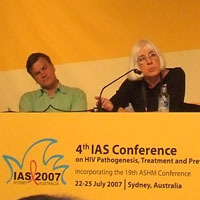 From July 22 to 25 July, Sydney played host to 6700 delegates from 133 countries for the International AIDS Society (IAS) Conference on HIV Pathogenesis, Treatment and Prevention.
From July 22 to 25 July, Sydney played host to 6700 delegates from 133 countries for the International AIDS Society (IAS) Conference on HIV Pathogenesis, Treatment and Prevention.
The conference was heralded by the ‘Sydney Declaration’ calling for ‘ten per cent of all resources dedicated to HIV programming’ to ‘be used for research towards optimizing interventions utilized and health outcomes achieved.’
Conference co-chair Dr Pedro Cahn noted in his opening remarks at the conference that ‘research funding in the developing world has not kept pace with the scale up of treatment and prevention programmes’ He added that research was needed to ‘tell us what impact our programmes are having in the areas of the world where ninety percent of the epidemic is focused’.
Cahn went on to praise Australia’s collaborative approach to HIV treatment and prevention that incorporates government, science and community expertise saying that it set the world an example of how to ‘achieve a significant and long lasting impact on the epidemic’. Whilst he praised Australian efforts to reduce stigma and discrimination against people living with, and communities particularly affected by, HIV, Cahn was critical of ‘high governmental authorities’ intentions regarding the rights of people living with HIV travelling to Australia. ‘Epidemics are not stopped by immigration officers. We are confronting HIV, not people living with HIV’ he said.
His remarks were echoed by his co-chair Dr David Cooper, who pointed to syringe exchange, peer education and universal public health as elements in a partnership that ‘has endured and has saved lives and supported whole communities.’ Dr Cooper also stressed the need for the partnership to be protected, by avoiding blame and having ‘political leadership that builds on success rather than undermining it’
Key developments in HIV research and prevention discussed at the conference included male circumcision, microbicides, clinical trials of new vaccines, roll out of ART in the developing world, the role of PrEp in prevention, the need for substantial research in paediatric treatment and the role of co-infections.



